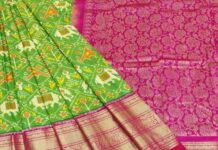 NEW DELHI: Weaving environmental concerns and fashion into fabrics of sustainability, young designers are looking beyond profit margins to tailor a new sensibility with collections that reduce the carbon footprint of textiles and reduce waste.
NEW DELHI: Weaving environmental concerns and fashion into fabrics of sustainability, young designers are looking beyond profit margins to tailor a new sensibility with collections that reduce the carbon footprint of textiles and reduce waste.
Like budding designer Ashita Singhal, who describes her journey in design as an “awakening”.
“The clothing industry is the second largest polluter in the world, second only to oil. It becomes a nasty business when the manufacturers are only concerned with the profit margin and not the environment,” the Delhi-based Singhal told PTI.
Surveys show that nearly five per cent of all landfill spaces consist of textile waste. Besides, 20 per cent of all freshwater pollution is caused by textile treatment and dyeing.
Over 80 billion garments are produced annually, worldwide, and it is estimated that 13.1 million tonnes of textile scrap go to the waste stream. Once in landfills, natural fibers can take hundreds of years to decompose.
They release methane and CO2 gases into the atmosphere. Additionally, synthetic textiles are designed not to decompose. In the landfill, they release toxic substances into groundwater and surrounding soil, states Charlie Ross in his book, “The Swatch Book”.
It was the sight of a huge ‘waste mountain’ on a roadside in South Delhi’s Okhla which changed Singhal’s view of fashion, instilling in her a sense of responsibility.
She said she was fascinated by ‘fast fashion’, the term used to describe the movement of designs from the catwalk to becoming fashion trends, and glamour and joined a fashion design course.
“Soon, I got acquainted with the ugly truths and reality of fast fashion,” said the 23-year-old who recently completed her PG in Fashion Design from Pearl Academy.
For her final project “Blue Poetry”, she reclaimed textile waste through handloom weaving and reinvented fashion by using sustainable design techniques, up-cycling and zero waste. The collection was showcased at the Amazon India Fashion Week 2018.
Singhal used eight years of left out pieces of hand-woven and block printed fabric from a design house and crafts persons. The textile waste was sorted and coordinated according to the color and fabric quality. It was then cut into strips and hand-woven into fabric.
“I have interpreted lost culture through recycling, up-cycling and zero waste pattern ensuring that efforts of the artisans doesn’t go to landfills,” said Singhal.
“Delhi is the most polluted city in the world. As a design student I wanted to exploit this opportunity to create garments which could help reduce the waste, which otherwise ends up in landfills,” she added.
Stressing that she wanted to raise awareness on eco-friendly means of living, she said she was concerned about carbon footprint while designing.
“Even in my classroom projects, I used to be disturbed with the textile waste generated just within three hours of a class.”
Sharing Singhal’s concern about the role of designers in minimizing the carbon footprint of the textiles is Smriti Jain from Bhopal.
Jain, who is also 23 and graduated in textile design recently, has developed a collection of contemporary hand-woven saris from Chanderi, a small town in Madhya Pradesh, using traditional techniques.
She chose to experiment with more sustainable techniques such as hand block printing, shibori, a traditional craft from Japan, and hand embroidery.
The collection features hand embroidery on the hand woven fabric.
“Chanderi silk has been used as a base in the collection. The fabric represents sensitivity and art, hand-woven by the weavers,” Jain said.
“My collection of saris takes its inspiration from India’s sustainable past. From handloom to block printing, the country’s idea of fashion was never about producing for the masses but encouraging the masses to be self-sufficient by using limited resources,” she said.
Being a textile designer, she said she wanted to relive those sensibilities of sustainability through her project. “The project is a hope for a sustainable tomorrow,” she added.
Keeping up the eco friendly fabric theme, Alcis Sports, a performance wear brand, has decided to discard polyester completely and use recyclable polyester instead across its entire polyester-based range.
“Alcis, which has been making t-shirts from waste plastic bottles since the past two years, has decided to go entirely plastic free and use recyclable polyester wherever it uses polyester,” a statement by the company said.
Generally, t-shirts are made of polyester – a man-made fiber, production of which involves huge quantities of water, chemicals and use of fossil fuels. The raw material and by-products are toxic which pollute water and air, causing several health hazards. PTI






